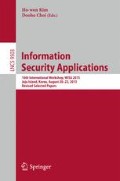Abstract
A spoofing attack for a wireless communication system is the most common attack method for unauthorized access and control. IEEE 802.15.4 is a standard that defines only physical and medium access control layers for low rate, low power, and low cost wireless systems. This standard is widely used as lower layers for not only several wireless communication standards but also customized protocols by manufacturers. However, security has not been considered seriously in these customized protocols, due to other important features including efficiency and cost. In this paper, in order to empirically analyze the real world threat in these systems, we chose to study three IEEE 802.15.4 based wireless communication systems as targets. We manually analyzed the customized protocols above IEEE 802.15.4 if there exist vulnerabilities to be exploited. For all three systems, we discover significant vulnerabilities. We implemented a spoofing attack for two targets, and we successfully controlled the targets by our spoofing attack. For the last target, we chose not to run the experiment due to significant safety reasons.
This research was supported by Next-Generation Information Computing Development Program through the National Research Foundation of Korea (NRF) funded by the Ministry of Science, ICT & Future Planning (No. NRF-2014M3C4A7030648).
Access this chapter
Tax calculation will be finalised at checkout
Purchases are for personal use only
References
IEEE Standard for Local, metropolitan area networks - Part 15.4: Low-Rate Wireless Personal Area Networks (LR-WPANs) (2011)
Sastry, N., Wagner, D.: Security considerations for IEEE 802.15.4 networks. In: WiSe. IEEE (2004)
Sokullu, R., Dagdeviren, O., Korkmar, I.: On the IEEE 802.15. 4 MAC layer attacks: GTS attack. In: SENSORCOMM. ACM (2008)
Jokar, P., Arianpoo, N., Leung, V.C.: Spoofing detection in IEEE 802.15.4 networks based on received signal strength. Ad Hoc Netw. 11(8), 2648–2660 (2013)
Jokar, P., Arianpoo, N., Leung, V.C.: Spoofing prevention using received signal strength for ZigBee-based home area networks. In: SmartGridComm. IEEE (2013)
KillerBee. https://code.google.com/p/killerbee/
Author information
Authors and Affiliations
Corresponding author
Editor information
Editors and Affiliations
Rights and permissions
Copyright information
© 2016 Springer International Publishing Switzerland
About this paper
Cite this paper
Choi, K., Son, Y., Lee, J., Kim, S., Kim, Y. (2016). Frying PAN: Dissecting Customized Protocol for Personal Area Network. In: Kim, Hw., Choi, D. (eds) Information Security Applications. WISA 2015. Lecture Notes in Computer Science(), vol 9503. Springer, Cham. https://doi.org/10.1007/978-3-319-31875-2_25
Download citation
DOI: https://doi.org/10.1007/978-3-319-31875-2_25
Publisher Name: Springer, Cham
Print ISBN: 978-3-319-31874-5
Online ISBN: 978-3-319-31875-2
eBook Packages: Computer ScienceComputer Science (R0)

